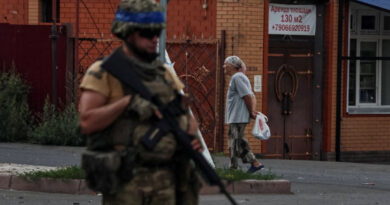Trump Calls on Putin to Agree to Cease-Fire Agreement
The president also commented on his conversation with Zelenskyy at the Vatican, stating, ‘I believe he grasps the situation well, and he seems eager to reach an agreement.’
On April 27, President Donald Trump called on Russian President Vladimir Putin to cease operations in Ukraine and agree to a cease-fire arrangement, as Secretary of State Marco Rubio indicated that the upcoming week is “crucial” in assessing the U.S. commitment to mediating a resolution.
Addressing reporters in New Jersey, Trump commented that the meeting “was positive” and that Zelenskyy expressed Ukraine’s urgent need for additional arms to defend against Russian aggression.
“I perceive him as more composed. I think he comprehends the situation, and I believe he is inclined to negotiate,” the president remarked. “We’ll observe how things unfold in the coming days.”
Trump expressed being “surprised” and “deeply disappointed” that Russia initiated attacks on Ukraine soon after U.S. special envoy Steve Witkoff’s discussions with Putin in Moscow on April 25.
“I urge him to cease fire, come to the negotiating table, and finalize the agreement,” Trump said, referring to Putin. “We have the framework of the agreement, and I expect him to sign it.”
“I believe they’re closer than ever but still not quite there,” he noted during the interview. “We can’t continue dedicating time and resources to this process if it isn’t going to succeed.”
Rubio emphasized that the following week is “vital” for determining whether the U.S. should persist in the Russia-Ukraine peace negotiations or redirect focus elsewhere.
He also indicated that the U.S. may consider actions against those obstructing efforts to conclude the conflict but highlighted a preference to avoid such measures to keep diplomatic avenues open.
Trump voiced disapproval on April 26, criticizing Putin for attacking civilian areas in Ukraine amidst ongoing peace discussions, raising doubts about the Russian leader’s intentions regarding the conflict’s resolution.





